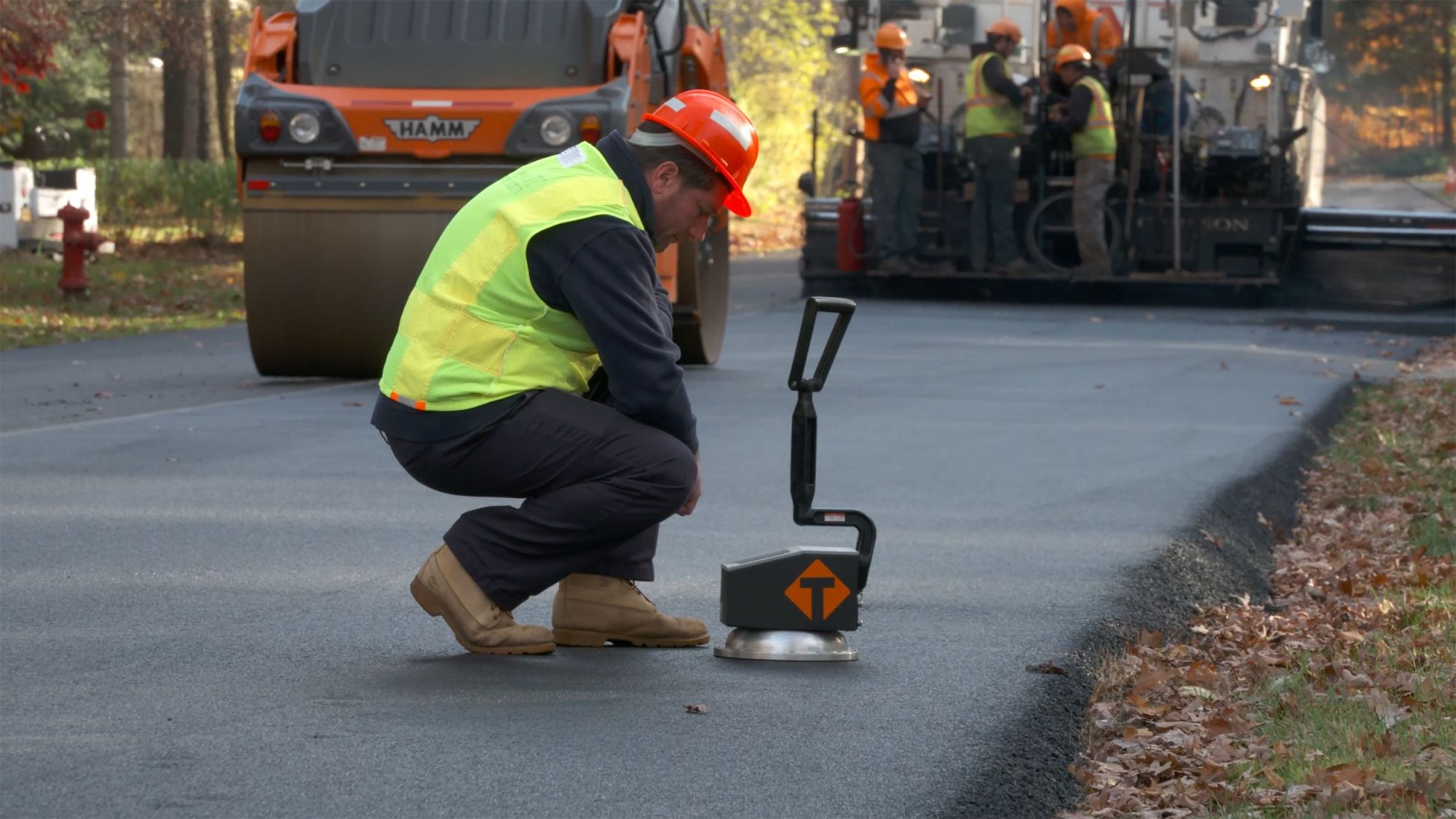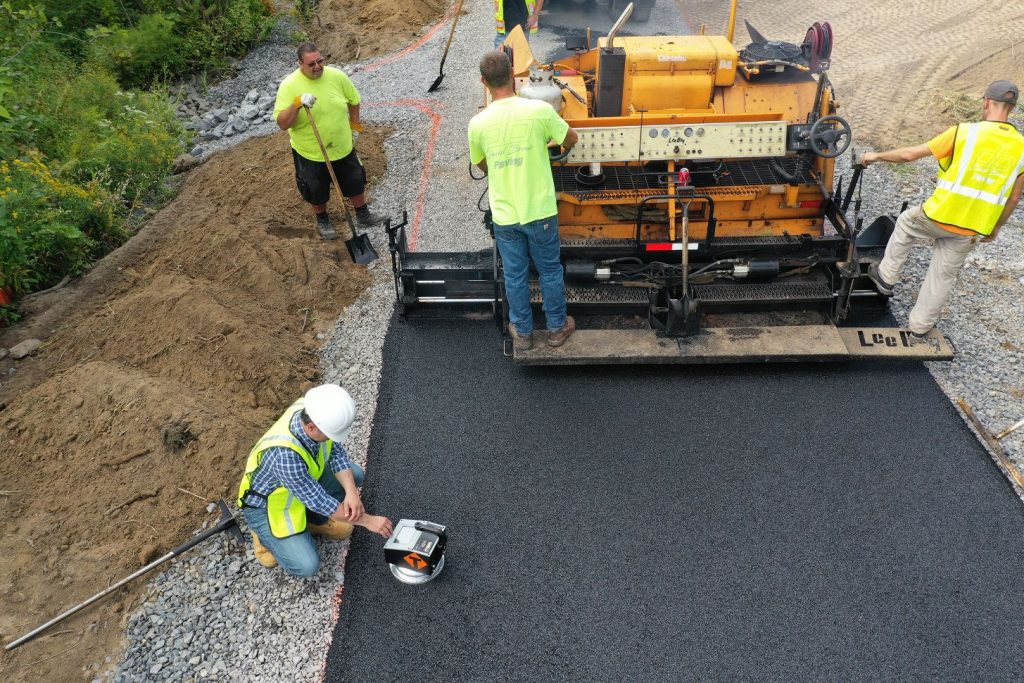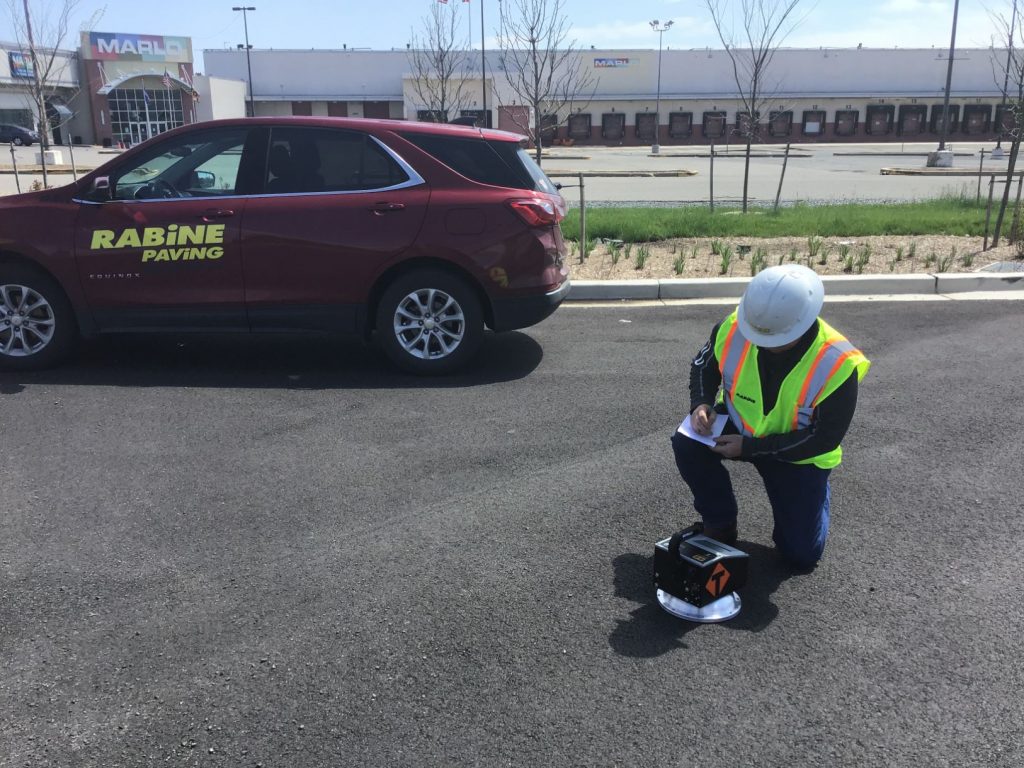Rabine Paving Invests in QC/QA with Pavement Quality Indicators
BY Sandy Lender

Asphalt contractors are seeing a trend toward heightened quality expectations from commercial customers. Asphalt professionals respond to that with warrantied work and tracked quality throughout the project. For Rabine Paving Mid Atlantic, headquartered in District Heights, Maryland, that meant taking a look at quality control/quality assurance (QC/QA) measures on the open mat as well as back at the lab. The team trialed a pavement quality indicator (PQI) Model 380 from TransTech Systems Inc., Latham, New York, in the fall of 2019 and soon ordered a trio of the non-nuclear density measuring devices for use across the company. General Manager of Rabine Paving Mid Atlantic Marshall Broadway sat down with AsphaltPro at the recent CONEXPO-CON/AGG 2020 tradeshow to discuss why their use is important for the company going forward.
Rabine Group Chairman and Founder Gary Rabine has created a passion statement for the company that Broadway shared: “Innovating to Serve.”
The innovation in this story begins with Rabine Group’s history of focusing on building a QC program. They have four PQIs for non-nuclear density testing, which has become an important piece to the program. TransTech Systems’ COO Jaret Morse said: “Rabine is creating their own quality control program in the commercial parking lot industry.”
Broadway explained they start by using the gauge during the paving process, as part of mix placement and compaction. He shared the example of two big box retail facilities in Indiana. The big box store owner required Rabine Paving Mid Atlantic have an independent testing entity; the client had its own independent testing entity.
“A mashup of the Rabine family of companies,” according to Broadway, worked on the two commercial projects. Within seven days on the two projects, they used the PQI during paving behind the screed before breakdown rolling to establish the roll pass count and validation testing throughout the shifts.

Here a crew demonstrates the use of a non-nuclear density gauge on the open mat. Photo courtesy of TransTech Systems Inc., Latham, New York
With a mobile lab on site, Rabine Paving Mid Atlantic was able to validate readings, using the PQI as the main device. “The PQI identified areas where we needed to change our roll pattern while we were in the production phase versus testing quality only at the completion of the job.”
“We had to hit 93 percent on the core,” Broadway said. “The PQI showed upward of 97 on our numbers. Our technician was telling me we were over-compacting with that 97 percent and we needed to back off a little on the rolling.” By backing off, the core came in at 92.7 percent, so the team went back to the established rolling pattern. “We went back to our established rolling pattern and back to getting 97 percent with the PQI non-nuclear density gauge and started passing again.”
Making those kinds of decisions during paving, rather than waiting until the end of a day’s work or the end of the project, saves a crew from penalties or from having to tear up and re-pave the day’s work.
Something else Broadway pointed out is the education and expertise contractors must offer to property owners now that multi-year maintenance programs are on the line.
“The facilities managers for the stores rely on us as the experts to guide them on the best mix designs and roller patterns,” he said. “Some have department of transportation specifications for high-traffic highways, Superpave mix designs, even P401 specs that they think are great for their parking lots because of a perceived strength. In fact, the shear forces of a commercial airliner landing on a P401 mix are completely different from loaded—or empty—eighteen wheelers slowly rolling up to and turning along the parking lot and in the loading areas of the store.”
This is something the savvy asphalt contractor must explain—prior to estimating or prior to accepting a bid—to the store owner or facilities manager, who may not know what they need or what they’re looking for in a parking lot pavement structure. Of course, a contractor’s pavement design or estimating team has to present a new design with care. Just like the rest of us, the engineer who selected something like a Superpave mix design with low-temperature cracking performance for a parking lot in Southern Louisiana doesn’t want to be attacked, but should be re-educated in a professional manner.
“Now we’re being asked to perform test strips,” Broadway explained. “We can educate on which mix designs are right and which are not right. Conventional placement practices have to change. That’s where the PQI comes in. Our quality has to come first. Quality and safety are most important to us as industry leaders with safety being our number one core value.”
Once a contractor and customer are on the same page with mix design and construction, change orders can still be expected. Surprises under the surface may require structural attention before the project continues or something as simple as inclement weather can interrupt the original plan.

Scott Donaldson from the Rabine Group’s Maryland team takes a reading with the pavement quality indicator (PQI) Model 380 in the field. Photo courtesy Rabine Group
“As ambient or roadway conditions change, the PQI can help you change your rolling pattern,” TransTech Systems’ CEO David Apkarian said. He gave the example of working on a roadway project. “If you come around a mountain in Colorado, you can go from sunny and 80 degrees to shade-covered with wind blowing across your mat. At that point, your rolling pattern may need to change dramatically.”
Broadway agreed. “Once you start shoving material or breaking aggregate or sensing a temperature change, you’ve got to change your rolling pattern. There’s still that need to make changes quickly.”
“Now that we have warranty work, we have to get a change in mindset in the industry,” Apkarian said. He spoke of the urgency in getting information to the roller operators. “We can’t have the core 3 miles behind the train. We need the gauge immediately behind the screed and immediately behind breakdown to assess true QC.”
For Rabine Paving Mid Atlantic, their four PQIs can be shipped to any project site or carried by the technician to the site. “I’ve taken it on the plane with me to project sites,” Broadway said. “We use the PQI on any project, whether it’s a commercial lot, residential property, whatever. Bring the QC device into these areas in the way it is supposed to be used and convince the owners, this is the way to build their parking lots.”
The innovative practice of building their own, true QC program proves Rabine Paving Mid Atlantic is taking its reputation as a quality contractor seriously. Its engineers, managers and laborers working together serve their customers individually, on a project-by-project basis. Proper instrumentation gives them confidence to make changes and set quality throughout each project, driving Rabine’s passion of “Innovating to Serve” to life.
